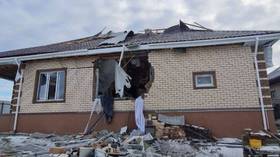Olmert under fire over Lebanese war
An Israeli panel will publish a report on the 2006 war with Hezbollah in Lebanon on Wednesday. An interim report published last April criticised Israeli Prime Minister Ehud Olmert, accusing him of lacking judgment and responsibility.
Wednesday's report will focus on the last days of the war, when Olmert ordered a ground assault in Lebanon while a UN-brokered truce was in the works.
1000+ people killed
The war, which lasted 34 days, claimed around 1,500 lives – most of them Lebanese civilians – and displaced more than a million people. It affected 12 cities and dozens of villages in Israel and almost turned into ruins a huge swathe of Lebanon.
It all started early morning on July 12, 2006 when Shiite movement Hezbollah crossed into Israel, killed three soldiers and kidnapped two others.
The Hezbollah group, denounced by many as a terrorist organisation, claimed the two soldiers could be only returned in exchange for Lebanese prisoners held in Israel.
But the deal was rejected. Israel responded with a series of air strikes and rocket attacks across Lebanon. A de-facto war was effectively declared against the Hezbollah guerrillas.
Israel, for its part, imposed a blockade on Lebanon followed by a large-scale offensive from air, land and sea.
In the first days of the war Israeli artillery destroyed the major highways and bridges, seriously limiting the militants’ movement. Beirut airport was bombed and most of the ports disabled. Then Israel targeted civilian settlements, where it suspected guerrillas were hiding.
One of Israel's deadliest air strikes killed 28 Lebanese civilians, half of them children, in the village of Qana.
International community steps in
After the attack, the Lebanese Prime Minister Fouad Siniora dubbed the Israelis war criminals.
Israel stressed that the war was against militants, not Lebanon, and accused Hezbollah of putting civilians in jeopardy by firing missiles from populated areas.
Tensions were reaching fever pitch. The international community had to act. The war officially ended, when a United Nations-brokered ceasefire went into effect on August 14.
Although Israel asserted its military dominance, the conflict appeared to do as much harm as good. Israel's government was widely condemned in the international community for being overly aggressive, and needlessly sacrificing the lives of many innocent Lebanese.












